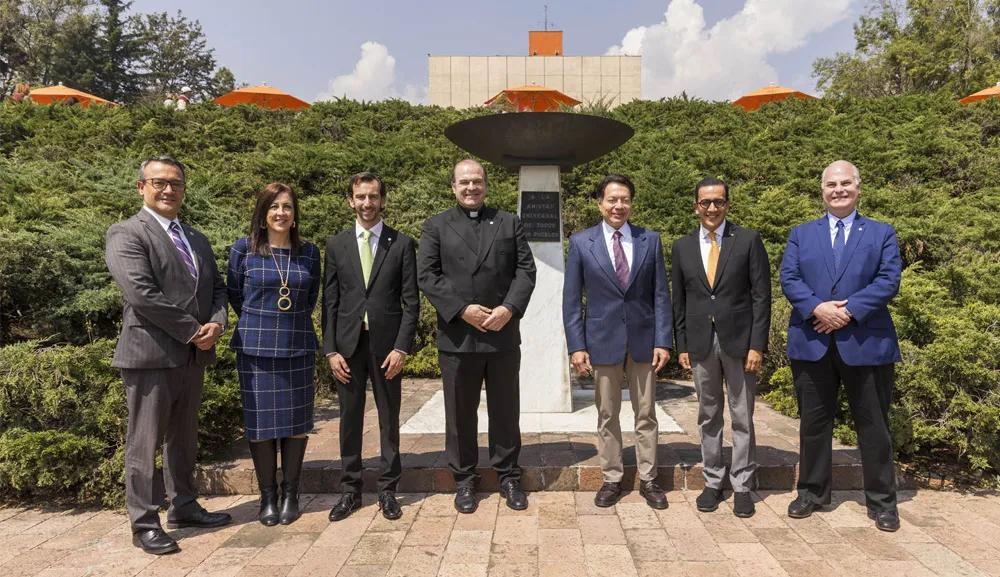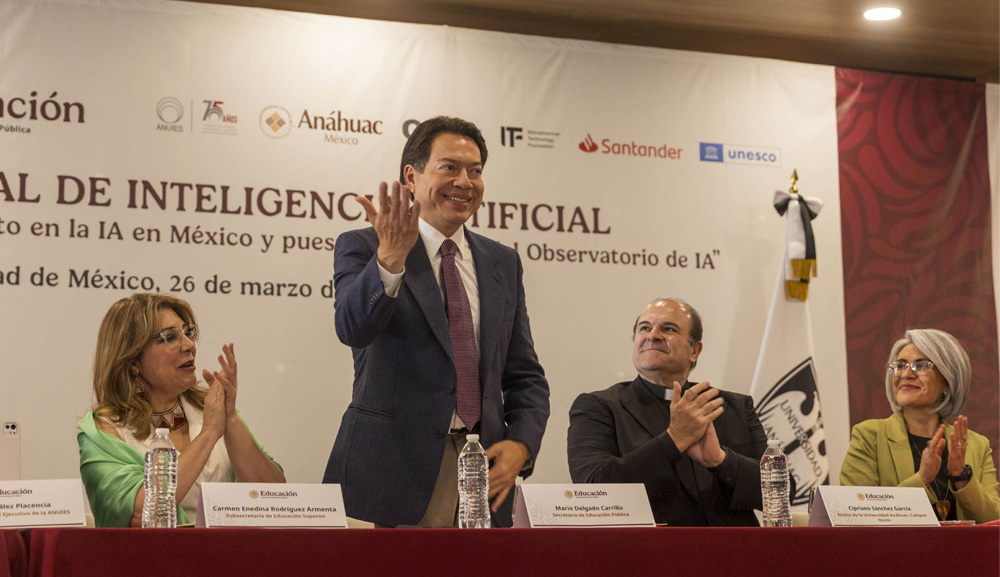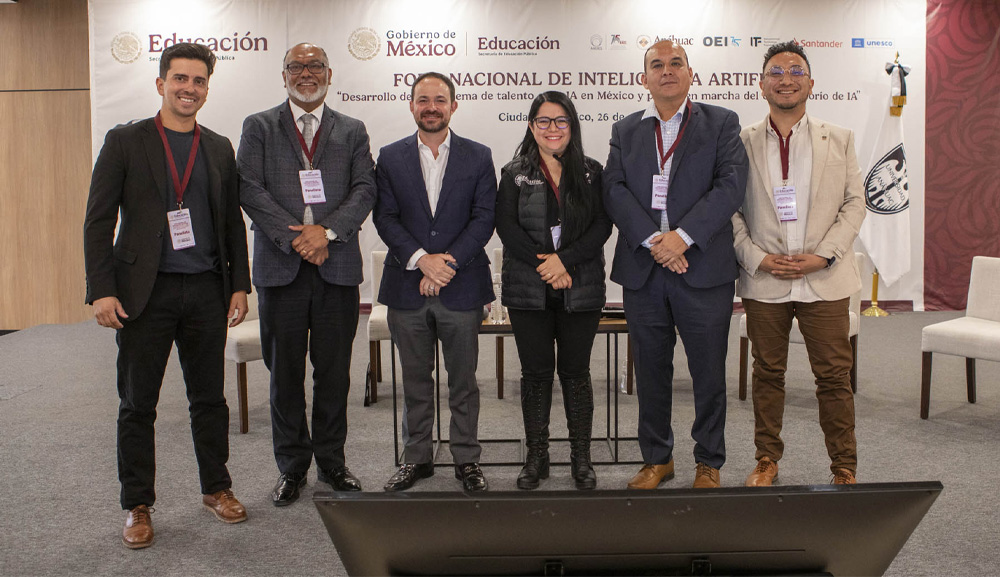Anáhuac México University, venue for the SEP's National AI Forum

Our North Campus was the venue for this important event. It launched the AI Observatory and defined a strategic path for transforming education in Mexico through technology.
On 26 March 2025, the North Campus of Anáhuac Mexico University was the venue for the National Forum on Artificial Intelligence with the slogan “Development of the AI talent ecosystem in Mexico and launch of the AI Observatory.” This event brought together authorities, academics, technology leaders, and representatives from the public, academic, and private sectors to promote an artificial intelligence (AI) talent ecosystem in the country and officially launch the AI Observatory, a diagnostic and educational strategy tool on a national scale.
During the inauguration ceremony, our rector, Dr. Cipriano Sánchez García, L.C., gave a speech focused on artificial intelligence's ethical and strategic use: ''Artificial intelligence is our ally, not just a tool''. He also presented Anáhuac Labs, a new technological innovation center dedicated to developing solutions in artificial intelligence, machine learning and data analytics. His speech reaffirmed the commitment of Anáhuac Mexico University to the training of talent in this field, emphasizing the need to coordinate efforts between academia, government and industry to build a solid, ethical, and competitive ecosystem.
He also acknowledged the initiative to set up the Artificial Intelligence Observatory, designed as a strategic guide to harness this technology for the country's benefit. He made a clear call to strengthen inter-institutional cooperation to achieve sustainable and inclusive development, with AI as a key ally.
The inauguration ceremony was attended by the Minister of Public Education, Mario Delgado, as well as key figures such as Carmen Enedina Rodríguez, Deputy Minister of Higher Education; Vladimir Valdez, Director General of Secondary Education; Rosa María Torres, Rector of the National Pedagogical University; Andrés Morales, Director of UNESCO in Mexico; Patricia Aldana, Mexico's representative to the OEI; Luis González, Secretary General of the National Association of Universities and Higher Education Institutions (ANUIES); Fernando Sepúlveda, President of the Iberoamerican Technology Foundation; Arturo Cherbowski, Executive Director of Santander Universities Mexico; and Alfredo Pacheco, Director General of the National Chamber of the Electronics, Telecommunications and Information Technologies Industry (CANIETI).

Mario Delgado emphasized that, like other technological moments in history, AI represents an opportunity that must be seized through education. "The future is not what will happen, but what we will do," he said, quoting Borges. He urged us not to fear AI but to use it for critical thinking, innovation, and justice.
Arturo Cherbowski reaffirmed the bank's commitment to education in Mexico, highlighting the more than 480,000 scholarships awarded and the urgent need to integrate technology to develop competitive talent. "Let's not strive for perfection, but commit ourselves to constant evolution," he added.
Andrés Morales of UNESCO introduced an ethical and environmental reflection. He warned of AI's social and ecological impacts, such as the intensive use of natural resources. He also called for efforts to focus on people and to promote critical, responsible, and fair adoption.
During her participation, Rosa María Torres formally presented the Interinstitutional Observatory of Artificial Intelligence in Higher Education in Mexico (OIIAES), a national platform created to analyze, monitor and promote AI's ethical, equitable and responsible use in Mexican higher education institutions (HEIs). Its mission is to promote public policies, training, innovation and educational governance related to this technology.
The OIIAES defines its action in three main areas:
Educational transformation through AI (impacting management, teaching, personalization of learning and research); risks and challenges such as unregulated use by students or the absence of regulatory frameworks; and the promotion of a framework of regulations and ethics, aligned with national and international principles (such as those of UNESCO and the OECD), that ensure transparency, privacy and equity.
The organizational structure of the OIIAES is composed of a National Coordinating Body, which is responsible for coordinating efforts; a Governing Council, the decision-making and oversight body; and several specialized committees (scientific-technical, ethics and regulation, and communication). Thematic groups will address areas such as teaching, evaluation, and equity in the use of AI.
Regarding collaboration, the Observatory will establish alliances with national and international universities, government agencies, research networks and private companies. It will participate in strategic forums, develop digital platforms, and create spaces for academic and technical exchange.
To ensure its sustainability, it will have mixed funding (public, private and international funds) and will apply impact assessment mechanisms in governance, innovation, networking and academic results. It will also implement clear rules for the admission of new members, methods for conflict resolution (such as mediation or arbitration), and a decision-making system based on consensus and specialized external advice.
The opening talk by Carlos Romero, Salesforce Education's leader in Latin America, explained how AI is entering the field of education through intelligent agents, co-pilots, predictive models and robots. He proposed seven principles for their effective integration, emphasizing that the goal is to support student success with personalized advice based on different learning styles.

Check the schedule of activities for the National AI Forum
The four concurrent panels addressed pressing issues such as:
Curriculum transformation, equitable access, teacher training, technology ethics, and labor productivity, and included experts from Meta and Huawei, the National Autonomous University of Mexico (UNAM), and the Ministry of Public Education (SEP), as well as representatives from Google, Benchmark Technologies, and Tecnológico de Monterrey.
Patricia Aldana of the Organization of Ibero-American States (OEI) emphasized the importance of reducing technological and cultural divides. "Artificial intelligence should be a force for democratizing knowledge, not for concentrating it."
The conclusions of the forum, presented by Carmen Rodríguez Armenta, Deputy Minister of Higher Education, offered a clear vision: the future of education involves understanding, adapting and leading with AI. Therefore, the Observatory will be key to articulating public policies, guiding educational practices and ensuring ethical and sustainable adoption.
It should be noted that this forum was organized by the Department of Institutional Development, headed by José Antonio Gea Guinovart, and by the Mexican Humanism Center, under the direction of Dr. Nora Ricalde Alarcón.
Anáhuac Mexico University, as the host institution, demonstrated with facts its leadership in promoting transformative education. The launch of the OIIAES marks a turning point in the national education strategy. Today, more than ever, teaching and learning with AI is no longer an option but an urgent commitment to the future of Mexico.
Access the event gallery here:

*Written by Crisette Romero Lugo, content editor, Institutional Communication Department.
For more information:
Dr. Nora Ricalde Alarcón
nricalde@anahuac.mx
Department of Institutional Development
Center for Mexican Humanism
